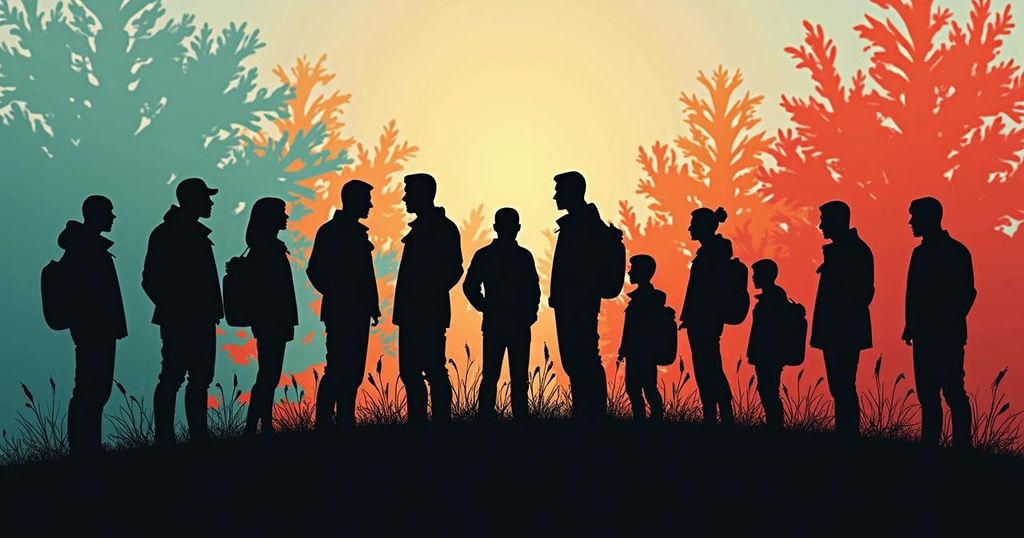Azerbaijan’s Human Rights Challenges Cast Shadow on Upcoming UN Climate Talks

Ahead of COP29, Azerbaijan faces international backlash for civil rights abuses against activists and ethnic Armenians, prompting U.S. lawmakers to call for political prisoner releases. Human Rights Watch highlights a crackdown on dissent, endangering the integrity of climate discussions. Azerbaijan denies these claims, emphasizing its natural resource management strategy amidst geopolitical complexities.
Azerbaijan’s human rights situation is facing scrutiny as the nation prepares to host the upcoming UN climate change summit, COP29, in November. Advocacy organizations such as Human Rights Watch and Freedom Now have released a report alleging a significant increase in government repression against critics and activists, including the arrest of notable human rights advocate Anar Mammadli, who has played a pivotal role in climate justice initiatives. Recent calls from U.S. lawmakers urge Secretary of State Antony Blinken to advocate for the release of political prisoners in Azerbaijan and address reported systemic human rights abuses while emphasizing the importance of the climate negotiations as a platform for energy security and rights advocacy. The report, published shortly after legislative members expressed concerns regarding ethnic cleansing in Nagorno-Karabakh, reveals substantial human rights violations including arbitrary detentions and unlawful killings based on a State Department assessment. Activists warn that the repression of civic engagement may jeopardize the inclusion of critical voices in climate discussions, undermining the efficacy of policies developed in these forums. Myrto Tilianaki of Human Rights Watch stated that the exclusion of those directly affected by climate challenges from negotiations is detrimental to crafting appropriate and effective solutions. Azerbaijan’s response has been to deny the validity of these accusations, asserting through its Washington embassy that all cases are handled within the realm of law and dismissing claims of disinformation campaigns aimed at discrediting the country. Nonetheless, the Human Rights Watch report elaborates on laws that have led to the arrest of activists and media personnel, framing these arrests as politically charged moves to stifle dissent in alignment with long-standing governmental practices to suppress freedom of expression. The choice of Azerbaijan to host the climate talks emerged against a backdrop where Russia obstructed bids from several EU nations, further complicating the geopolitical landscape surrounding energy discussions. As Azerbaijan maintains a significant reliance on fossil fuels, it asserts that it can achieve climate objectives while continuing fossil fuel production, a position underscored by President Ilham Aliyev’s declaration of the nation’s energy assets as divine gifts that ought not to provoke condemnation if utilized for national progress. Amidst these tensions, cases such as that of economist Gubad Ibadoghlu, alleged to have engaged in counterfeiting and extremism, illustrate the ongoing suppression of dissenting opinions regarding the management of Azerbaijan’s resources. Should he be convicted, he faces severe penalties, reflecting a broader pattern of state repression aimed at silencing critical discourse surrounding resource governance and economic equity in the nation.
This article addresses the interplay between Azerbaijan’s hosting of the UN climate change summit and its ongoing human rights challenges. As international scrutiny intensifies regarding the country’s treatment of dissenting voices and ethnic minorities, particularly the Armenian population amid geopolitical tensions post-conflict in Nagorno-Karabakh, the implications for civil society participation in climate discourse become paramount. The narrative also sheds light on the broader context of energy dependency and governance, linking human rights violations to political suppression and the strategic exploitation of natural resources in the face of global climate commitments.
In conclusion, as Azerbaijan prepares to host vital climate negotiations, it is performing under the shadow of significant human rights grievances. Activists and U.S. lawmakers are urging greater awareness and action regarding civil rights violations, positing that the lack of civic space could adversely affect climate policy outcomes. The legitimacy of Azerbaijan’s role in leading global climate discussions remains challenged by its own record of repression, raising critical questions about the nexus of human rights and environmental governance.
Original Source: www.mainepublic.org








